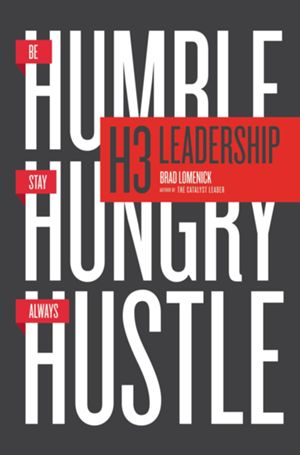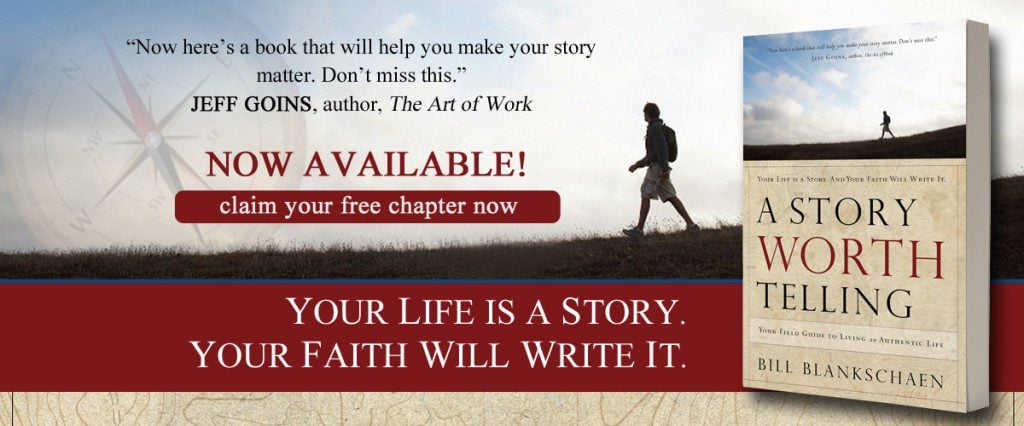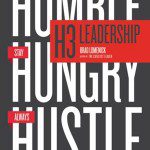I am privileged to host a 3-part Q & A series with my friend Brad Lomenick on his new book H3 Leadership: Be Humble. Stay Hungry. Always Hustle. Brad is a leadership consultant, speaker, founder of BLINC, and author of The Catalyst Leader — and a really terrific guy who practices what he preaches.
As the former president and key visionary of Catalyst, he learned a lot about leadership and reveals a lot in this book about how God prepared him for this next phase of growth he’s presently experiencing.
One of your most powerful ideas in the book is about creativity. You argue that it’s not something some people are just born with—that it’s a habit that can be developed. When did you realize this?
Brad: It became really clear to me while leading creative — and by creatives, I mean people responsible for innovation and brainstorming and thinking outside the box – that many of us are asked to lead those kinds of teams, and we sense pretty quickly that that’s not the way we’re wired.
While leading, I had to wrestle with questions about creativity––do I just not know how to do this? Am I not part of that group? Do I need to bow out of being a part of the creative process? I realized the answer to all of those questions is no. Most of the time, creativity and innovation come out of a process, and the process is what actually allows a truly creative idea to emerge.
It’s important for leaders to realize that they don’t have to be the smartest person, the most creative, or an exceptionally innovative thinker. What they have to be willing to do is to allow the process to define how creativity happens. And most of us aren’t…we’re too impatient. Most of the time we end up quitting on an idea right before the breakthrough is about to happen.
It takes patience. It takes a culture that says we’re willing to wait on something. It takes leaders who are willing to say, “We’re going to let that stew for a while.”
Many of us are put in the places of leading those kinds of teams, and we sense pretty quickly that that’s not the way we’re wired.
You say innovation should be a habit, too, and that leaders should be change agents. Why is innovation- specifically, continuous, persistent innovation- so important for leaders?
Brad: Innovation is pushing yourself. When I say change agent, I’m referring to someone who is not just willing to put up with change, but someone who’s willing to embrace it. They see change as a friend and recognize that without change, things die.
Innovation is all about being intentional. It takes courage, stamina, and spark to be intentional, but it also takes failure. You have to know that you’re going to fail, over and over again.
We tend to automatically associate innovation with creativity––and that’s not wrong. It does require creativity. But it’s more about intentionality––the mindset of constantly pursuing something better, of pushing the boundaries and never sitting still.
Healthy things grow, and growth requires change. Leaders who don’t change––don’t innovate––are going to be left behind.
You also write that no habit is more important than execution. Why?
Brad: Execution is incredibly important––and so many leaders are actually pretty bad at it. I think that’s due in large part to the fact that many leaders are natural initiators who are invigorated and motivated by taking risks on new endeavors. Getting started is important. But finishing is more important––otherwise, what’s the point?
Getting things done and making it happen is so important as a leader. Many would argue that leaders should solely focus on idea creation, vision, and hang in the corner office only concerned about creating the future. But I would suggest that the best leaders today take a different approach.
Yes, they are focused on idea creation, and vision, and creating the future. While equally committed to being in the trenches, besides your team, with your hands in the dirt helping dig the ditch. Strong leadership now requires consistent action. Go and Do, not just sit and be. Leadership in action is leadership that has traction.
Move things forward. Make things happen. Get it done. Constant forward motion.
In the book, we delve deeply into ways to cultivate a habit of execution. We look at procedural tips like creating a plan for accountability and discovering the time of day when you’re the most productive, to hiring good people who are strong finishers––not just strong talkers.
What does the world need most from leaders today?
Brad: That’s a tough question because I think the scorecard for leaders is cumulative. I mean, you can live out a few of these habits well, but if you’re not pursuing and embracing all of them, then you’re still missing pieces of the puzzle. Your leadership will feel incomplete, both to you and to others.
That said, I think the most important thing for leaders today is to understand their individual identity and calling, and to be authentic.
We don’t need perfect leaders. We need realness over relevancy. That’s the good news. The pressure is really off if leaders are willing to lead from their authentic selves. There’s such a hunger for realness today. If you’re willing to embrace that, people will follow you.
I have a deep passion for helping leaders lead well. It’s what drives me. I believe it’s my stewardship, and my responsibility to help these leaders do their jobs well- all over our country in our churches, businesses, and all organizations to lead well. And ultimately finish well.
And I’m incredibly optimistic about the next wave of leaders who are now stepping into leadership roles. It’s a generation of leaders willing to work their guts outs for something bigger than themselves, and also willing to work together to accomplish the big vision.
Click here to grab a copy of H3 Leadership now.
And if you’re a fan of Brad’s, click here to see what he said about my latest book A Story WorthTelling: Your Field Guide to Living an Authentic Life.













